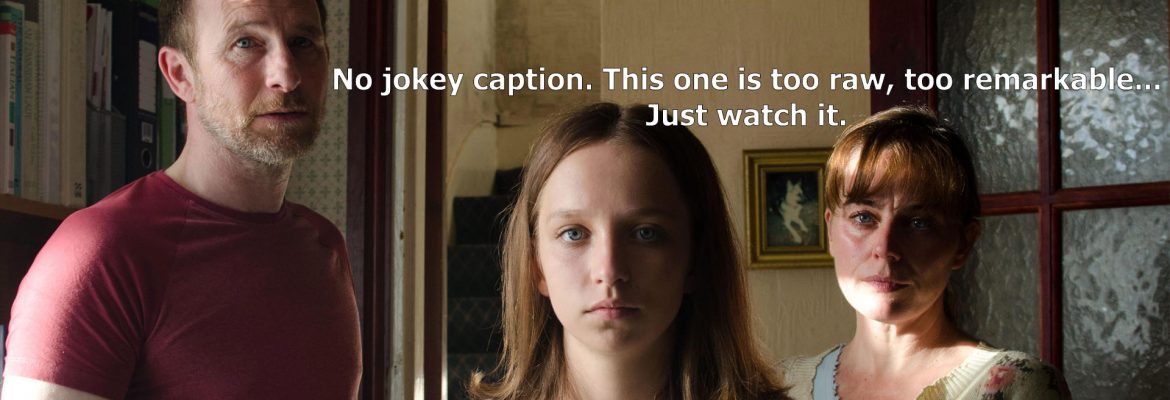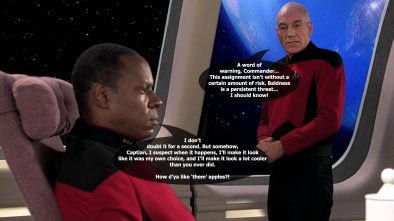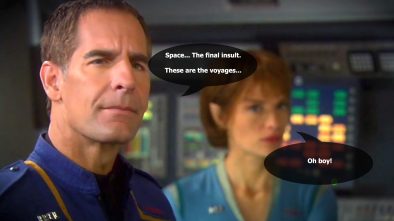Countless Failures.
A look at the TV Series ‘Three Girls’ written by Nicole Taylor and starring Molly Windsor, Maxine Peake and many others.
A question I’ve been asked a staggering once, is why I called this site Outlaw Revue instead of Outlaw Review. Now seems like a good opportunity to answer this publicly.
My original intention for this site was to create written pieces that would offer my thoughts on titles of my choice, but to do so in a way that would entertain. I wanted each article to be like a little skit that people could chortle to lightly and not feel like they’re being lectured at.
A revue is meant to be a piece of theatrical entertainment, usually based on topical issues. By switching review for revue, it was meant to be a bit of wordplay to signify my intentions.
While I’m not one for blowing my own trumpet, I would like to think that, up to now at least, I’ve been in the ball-park of my original spec for the things I’ve written. But that’s about to change.
There are some things you just can’t be flippant, light-hearted and jokey about. And the BBC miniseries ‘Three Girls’ is one of them.
In the space of three hours, it tells the story of gangs of men who groomed and sexually exploited vulnerable teenagers, the ebbs and flows of the police work involved, the effect on the families of the victims and the stories of the victims themselves.
It sounds like it ought to be a hurried and messy programme; all of that in just three hours? And what’s more, how can you do a story like that justice when it’s all based on real events?
Somehow, they do. What we get is one of the most powerful bits of television I have ever watched. Not a single once, did I feel something was glossed over, or that too big a time jump occurred, or that something was getting screen-time that would have been better served from another perspective. It was flawlessly executed. This compacted (note, not reduced, but compacted) nature of the story helps to keep every detail, every reaction, every moment of what we see, a visceral and prominent memory, stored in short-term recall so we’re always aware of how anything relates to something.
This is helped a great deal by a strength of performance that even the mighty Chuck Norris would doff his hat to. Whether you’re watching a teenage girl, a parent or someone from the police or the law-courts, you’d be forgiven for thinking that you were watching the original, actual events, captured somehow in glorious high definition.
The only time I felt a performance was getting a little too theatrical was Maxine Peake’s character in the sexual health centre who had been reporting – with little success – the suspected abuse to the police and being stonewalled for the most part. But while everything else holds up so chillingly well, I’m going to have to assume that the real person, perhaps, was someone who carried themselves in such a way. Whether she is or isn’t, it isn’t enough to take you out of the moment and the passion and the fight that the character brings to the story is incredibly welcome amongst so much ignorance and failure on the part of the authorities who could have made a difference.
America is the dominant force in visual media. The quantity of programming they produce is simply mind-scrambling. I’ve seen a lot of true-crime documentaries about big failures in the US legal system and each time, you wonder if the country has really moved on much from the days of the wild west and gunslingers. One starts to feel like it’s a country that gets a lot more wrong than it does right. Of course, we know that’s not the case, but when you have so many shows focussing on the problems, it’s hard not think it.
It’s also hard not to get a little patriotic smugness creep in. “The UK wouldn’t have made ‘that’ mistake.” You see a story of lazy or corrupt police and you shake your head and say, “Thank goodness, we’re so much better than that in the UK.”
But are we?
What ‘Three Girls’ shows us, unashamedly and without holding back any punches, is a British policing system that spent too much time with its fingers in its ears trying to pretend there was no problem. Police forces that were afraid to investigate some horrific and sickening reports of sexual assaults because the racial divide might be inflammatory.
What ‘Three Girls’ shows us, especially those of us who remember when the story broke in the news all those years ago but have forgotten many key facts, is that it isn’t about three vulnerable kids. It was potentially hundreds and hundreds of children who had fallen victim in some form or another.
It reminds us that the UK has its own problems we need to address. That our police, while not the worst in the world, certainly have a lot of room for improvements and just how prejudiced and critical our social services can be of ‘certain types of people’.
Each episode begins with a note to advise us of the authenticity of the events we are about to watch. A little prod to let us know that while it might all be a gripping bit of crime TV, it’s way bigger than that.
Whilst everyone did an amazing job in the show, I think special credit must go to Paul Kaye for his portrayal of a desperate father, trying to figure out what’s going on with his kid. He swings from indifference to outraged, from shouting to crying, from concerned to curious, from scared to heart-warming, and all with grace and believability. Is this really the same guy who did those cringe-worthy (but occasionally brilliantly cutting) Dennis Pennis sketches all those years ago? I’ve seen him in a few things over the years, but this is a stand-out performance that I’m not likely to forget.
Last of all, a shout out to the real victims of the attacks, especially the one the show called Holly Winshaw, the lead in this show. Her court testimony, read word-for-word in part 3, is the voice of someone who had waited a long time to be heard. To have gone through everything she did and to still have the strength to say what she did, takes the courage and nerve of someone far greater than me.
The closing messages as the end credits prepare to roll offer very mixed messages. Some are positive, some are not. But all of them are messages we need to consider. At the time of writing, this BBC drama is available on Netflix. I would urge people to watch it.
Sometimes, we need to have a bite-size version of something for us to be able to swallow. And like the holocaust, like the terrorist attacks in September 2001, this is a story that we must learn from and do what we can to make sure that we do our utmost to prevent. And if we really can’t prevent it, at least we can learn to listen more closely to those in distress, to act more diligently, more proactively, to see that victims are supported and criminals brought to justice before the problem can manifest into something so big, it can never be cut out and dealt with.
A reason why you should watch it: Perhaps you like re-enactments of true-crime, maybe you remember the story from the news and want to know the inside story, or maybe you just appreciate amazingly well written, expertly performed, gripping and powerful television. Just check it out.
A reason why you shouldn’t watch it: None. Unless you’re a particularly fragile flower that might be alarmed by such a story, but even that shouldn’t stop you. This is a story that needs to be told. It needs to be heard. It needs to never happen again!



